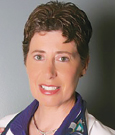Two investigative groups have reported interesting observations about genomic alterations in the tumors of young patients with lung cancer. Notably, ALK rearrangement was the most common driver mutation found, in studies reported at the 16th World Conference on Lung Cancer.1,2
“To our knowledge, the Genomics of Young Lung Cancer study is the first of its kind to look prospectively at the genomic drivers of primary lung cancer in this population,” said Barbara J. Gitlitz, MD, Associate Professor of Clinical Medicine, Keck School of Medicine, University of Southern California, Los Angeles, presenting on behalf of the Addario Lung Cancer Medical Institute.
Young patients with lung cancer may be prime candidates for personalized medicine strategies, as they tend to have more mutations that can be treated with existing targeted therapies, according to the study’s preliminary results, she added.
“We wanted to draw attention to lung cancer in young adults, as far too often there is a long delay in diagnosis because lung cancer was never considered in the differential diagnosis of their symptoms. We want to end the stigma that lung cancer is only a disease of elderly smokers,” said Dr. Gitlitz.
A First in Recruitment
The study is also a “first” in recruiting participants via the Internet. All subjects had developed lung cancer before age 40.
“Participants can enter at a site that has IRB [institutional review board] approval, or via a website where people could remotely consent from anywhere in the world and participate in our clinical trial,” Dr. Gitlitz said at a press briefing.
Because of the website (https://www.openmednet.org/site/alcmi-goyl), 44% of patients enrolled online, primarily from all over the United States, Europe, and Australia. Comprehensive genomic profiling was done on tumor tissue by the FoundationOne assay; further genomic profiling with the FoundationOne Heme test was done on tumor samples of subjects with advanced adenocarcinoma who were wild-type for the seven anticipated oncogenes, to identify other targetable drivers.
The goals of this study are to identify a “genomically enriched subtype” of lung cancer, to facilitate the delivery of targeted therapy, and to lay the groundwork for further research, Dr. Gitlitz remarked.
High Proportion of Actionable Mutations
Dr. Gitlitz presented data on the first 68 patients (33 men, 35 women) enrolled to date, whose median age at diagnosis was 35 years; 60 patients had adenocarcinoma, mostly stage IV; 7 had squamous cell tumors, and one patient had small cell lung cancer.
Genomically, among the 50 patients with stage IV adenocarcinoma, 76% had an actionable mutation, a much higher proportion than the researchers expected. ALK mutations were highly prevalent (44%), whereas EGFR mutations were observed in 26% and ROS1 rearrangement was found in 6%.
“We suspected that young adults with lung cancer might be a special population enriched for driver mutations. We have far exceeded our statistical expectations, particularly when it comes to ALK rearrangements,” she commented.
For the other 24%, with stage IV adenocarcinoma, deeper sequencing uncovered “some very interesting genomics,” she said. These rarer mutations included an EGFR RAD51 fusion, EGFR kinase domain duplication (KDD), HER2, ATM, BRCA2, and TP53 mutations.
“The EGFR RAD51 fusion is being described further as an actionable EGFR mutation,” said Dr. Gitlitz. EGFR-KDD has recently been investigated by another group.2
“EGFR-KDD was seen in a 33-year-old male with stage IV adenocarcinoma who had a 7-month partial response with afatinib [Gilotrif], and at progression, resequencing revealed an EGFR-dependent mechanism of acquired resistance to afatinib, thereby validating EDGR-KDD as a driver alteration and therapeuic target,” she added. “Cell lines transformed to express this mutation, were also amenable to EGFR tyrosine kinase inhibition, so a new actionable mutation has been described by looking at young emergent lung cancer.”
Dr. Gitlitz concluded with a plea to oncologists to perform comprehensive genomic testing on young patients. “We encourage all practitioners to obtain a panel of genomics on all of their patients, as far too often we see only one or two mutations tested for and then no further testing.” The Genomics of Young Lung Cancer trial is still accruing.
Japanese Study Results
Kosuke Tanaka, MD, of the Aichi Cancer Center Research Institute in Nagoya, Japan, also reported that the majority of young patients in his study had driver oncogenes.3
Dr. Tanaka and his colleagues retrospectively analyzed the clinical and genetic characteristics of 67 patients (40% male) with stages I–IV adenocarcinoma who were diagnosed at age 40 or younger. Median age was 36 years, 39% were never-smokers, and 68% had stage IV disease at diagnosis.
Similar to Dr. Gitlitz’s study, in this study, 75% of patients had a driver oncogene, primarily ALK rearrangement (45%). EGFR mutations were observed in 27%. Rarer oncogenes included HER2 mutations, RET translocations, and KRAS.
Dr. Tanaka agreed with Dr. Gitlitz: “We should not miss the opportunity of EML4-ALK examination in the younger population, considering that the frequency in stage IV adenocarcinomas is nearly 60%,” he said. “We should proceed to minor driver oncogene tests when EML4-ALK translocation and EGFR and KRAS mutations are all negative…. Comprehensive data are urgently necessary to appropriately provide tailor-made treatment with molecularly targeted therapies.” ■
Disclosure: Dr. Gitlitz has served on the speakers bureau for Genentech and Lilly. Dr. Tanaka reported no potential conflicts of interest.
References
1. Gitlitz BJ, Morosini D, Sable-Hunt A, et al: The genomics of Young Lung Cancer Study. 16th World Conference on Lung Cancer. Abstract ORAL22.05. Presented September 8, 2015.
2. Gallant JN, Sheehan JH, Shaver TM, et al: EGFR kinase domain duplication is a novel oncogenic driver in lung cancer that is clinically responsive to afatinib. Cancer Discov 5:1155-1163, 2015.
3. Tanaka K, Oya Y, Yoshida T, et al: Oncogenic profiling in lung adenocarcinoma emerged in the youth. 16th World Conference on Lung Cancer. Abstract ORAL22.07. Presented September 8, 2015.




